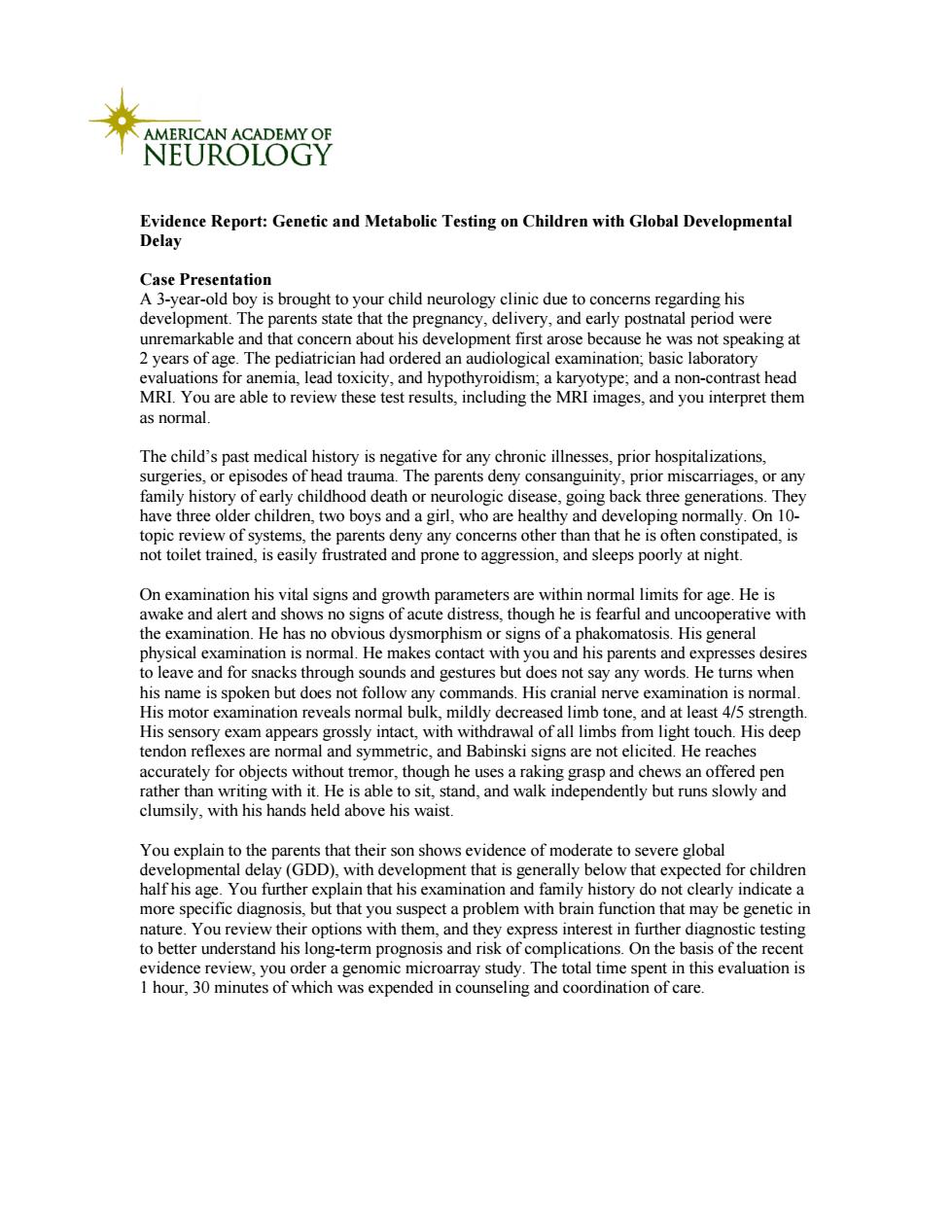正在加载图片...

R68光9 Evidence Report:Genetic and Metabolic Testing on Children with Global Developmental Delay CcPreialheiobouehto arding his unremarkable and that concern about his development first arose because he was not speaking at 2 years of age.The pediatrician had ordered an audiological examination,basic laboratory uding the M mages.and you interpret ther The child's past medical history is negative for any chronic illnesses,prior hospitalizations, surgeries,or episodes of head trauma.I he parents deny consanguinity,prior miscarrages,or any rly childhood death or ne going ba three generanon a gm than that hes oleterand stratiht On examination his awake anda a 二 La ha cssHsooemirewih es desires or me mildly decrease tone,and at least engt y exam appea His deep accurately for obiects without tremor.though he uses a raking sp and chews an offered pen rather than writing with it.He is able to sit,stand,and walk independently but runs slowly and clumsily,with his hands held above his waist. ental delav ent that ence of m half his age.You further explain that his examination and family history do not clearly indicate a more specific diagnosis,but that you suspect a problem with brain function that may be genetic in nature.You review their options with them,and they express interest in further diagno tic testing ns long-term prognosis and r ons.on s of t in ended in counsen and coordination of careEvidence Report: Genetic and Metabolic Testing on Children with Global Developmental Delay Case Presentation A 3-year-old boy is brought to your child neurology clinic due to concerns regarding his development. The parents state that the pregnancy, delivery, and early postnatal period were unremarkable and that concern about his development first arose because he was not speaking at 2 years of age. The pediatrician had ordered an audiological examination; basic laboratory evaluations for anemia, lead toxicity, and hypothyroidism; a karyotype; and a non-contrast head MRI. You are able to review these test results, including the MRI images, and you interpret them as normal. The child’s past medical history is negative for any chronic illnesses, prior hospitalizations, surgeries, or episodes of head trauma. The parents deny consanguinity, prior miscarriages, or any family history of early childhood death or neurologic disease, going back three generations. They have three older children, two boys and a girl, who are healthy and developing normally. On 10- topic review of systems, the parents deny any concerns other than that he is often constipated, is not toilet trained, is easily frustrated and prone to aggression, and sleeps poorly at night. On examination his vital signs and growth parameters are within normal limits for age. He is awake and alert and shows no signs of acute distress, though he is fearful and uncooperative with the examination. He has no obvious dysmorphism or signs of a phakomatosis. His general physical examination is normal. He makes contact with you and his parents and expresses desires to leave and for snacks through sounds and gestures but does not say any words. He turns when his name is spoken but does not follow any commands. His cranial nerve examination is normal. His motor examination reveals normal bulk, mildly decreased limb tone, and at least 4/5 strength. His sensory exam appears grossly intact, with withdrawal of all limbs from light touch. His deep tendon reflexes are normal and symmetric, and Babinski signs are not elicited. He reaches accurately for objects without tremor, though he uses a raking grasp and chews an offered pen rather than writing with it. He is able to sit, stand, and walk independently but runs slowly and clumsily, with his hands held above his waist. You explain to the parents that their son shows evidence of moderate to severe global developmental delay (GDD), with development that is generally below that expected for children half his age. You further explain that his examination and family history do not clearly indicate a more specific diagnosis, but that you suspect a problem with brain function that may be genetic in nature. You review their options with them, and they express interest in further diagnostic testing to better understand his long-term prognosis and risk of complications. On the basis of the recent evidence review, you order a genomic microarray study. The total time spent in this evaluation is 1 hour, 30 minutes of which was expended in counseling and coordination of care